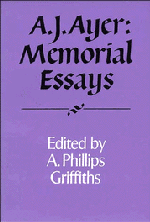Book contents
- Frontmatter
- Contents
- Preface
- A Defence of Empiricism
- Ayer: the Man, the Philosopher, the Teacher
- Ayer's Place in the History of Philosophy
- AYER'S ATTACK ON METAPHYSICS
- Ayer and World Views
- Language, Newspeak and Logic
- On the relation between Common Sense, Science and Metaphysics
- Logical Positivism and Intentionality
- Probability and the Evidence of our Senses
- Seeing Qualia and Positing the World
- Three Varieties of Knowledge
- The Importance of ‘If’
- Ayer's Ethical Theory: Emotivism or Subjectivism?
- Subjectivism and Toleration
- An Interview with A. J. Ayer
- Notes on Contributors
- References
- Index
The Importance of ‘If’
Published online by Cambridge University Press: 01 July 2010
- Frontmatter
- Contents
- Preface
- A Defence of Empiricism
- Ayer: the Man, the Philosopher, the Teacher
- Ayer's Place in the History of Philosophy
- AYER'S ATTACK ON METAPHYSICS
- Ayer and World Views
- Language, Newspeak and Logic
- On the relation between Common Sense, Science and Metaphysics
- Logical Positivism and Intentionality
- Probability and the Evidence of our Senses
- Seeing Qualia and Positing the World
- Three Varieties of Knowledge
- The Importance of ‘If’
- Ayer's Ethical Theory: Emotivism or Subjectivism?
- Subjectivism and Toleration
- An Interview with A. J. Ayer
- Notes on Contributors
- References
- Index
Summary
Every week of term, on Wednesday afternoons, during most of his years at University College, Ayer held a seminar. Strangely, he makes no mention of that seminar in his autobiography, although it was a more serious and productive affair than his Monday evening seminar, which he does mention. At the Wednesday seminar, conditionals were often the subject for discussion. They are intriguing things in themselves but the attention they received must have been due, in large part, to their central role in Ayer's philosophy. Ayer was a phenomenalist, but he did not go so far as that prince of phenomenalists, George Berkeley, and assert that the things around us in space, chairs and tables, trees and rocks and lakes, the sun, moon and stars, were sensations, sensations of various kinds. Ayer's view was more that of John Stuart Mill, that these things were permanent possibilities of sensation. To assert the existence of a lake was to assert that if certain characteristic sensations occurred, then certain other characteristic sensations would follow. In that way, conditionals played a central role in Ayer's phenomenalism. That phenomenalism, however, needed to agree with an even more central element of his thought, the positivism he derived, perhaps from the philosophy of the Vienna Circle, perhaps from David Hume. According to that positivism, experience sets limits to understanding. If we can experience nothing but the presence or absence of sensations, then propositions concerning the presence or absence of sensations are all we can understand. Now a conditional concerning sensations does not imply the presence of sensations and, although it does imply the absence of sensations, it implies more besides.
- Type
- Chapter
- Information
- A. J. Ayer: Memorial Essays , pp. 167 - 180Publisher: Cambridge University PressPrint publication year: 1992

